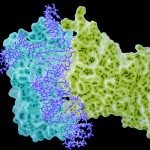Lien vers Pubmed [PMID] – 26038978
J Chem Inf Model 2015 Jul;55(7):1413-25
To date, no systematic study has assessed the effect of random experimental errors on the predictive power of QSAR models. To address this shortage, we have benchmarked the noise sensitivity of 12 learning algorithms on 12 data sets (15,840 models in total), namely the following: Support Vector Machines (SVM) with radial and polynomial (Poly) kernels, Gaussian Process (GP) with radial and polynomial kernels, Relevant Vector Machines (radial kernel), Random Forest (RF), Gradient Boosting Machines (GBM), Bagged Regression Trees, Partial Least Squares, and k-Nearest Neighbors. Model performance on the test set was used as a proxy to monitor the relative noise sensitivity of these algorithms as a function of the level of simulated noise added to the bioactivities from the training set. The noise was simulated by sampling from Gaussian distributions with increasingly larger variances, which ranged from zero to the range of pIC50 values comprised in a given data set. General trends were identified by designing a full-factorial experiment, which was analyzed with a normal linear model. Overall, GBM displayed low noise tolerance, although its performance was comparable to RF, SVM Radial, SVM Poly, GP Poly, and GP Radial at low noise levels. Of practical relevance, we show that the bag fraction parameter has a marked influence on the noise sensitivity of GBM, suggesting that low values (e.g., 0.1-0.2) for this parameter should be set when modeling noisy data. The remaining 11 algorithms display a comparable noise tolerance, as a smooth and linear degradation of model performance is observed with the level of noise. However, SVM Poly and GP Poly display significant noise sensitivity at high noise levels in some cases. Overall, these results provide a practical guide to make informed decisions about which algorithm and parameter values to use according to the noise level present in the data.
